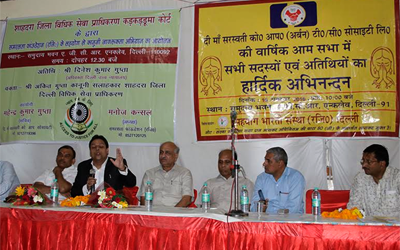
New Delhi | April | 17, 2018 :: Kailash Satyarthi has called the alarming and unstoppable rise of rapes and abuse against children as a National Emergency. Mr. Satyarthi said, “Each time a daughter is raped and killed; India’s soul is raped and killed. Every day, 55 children are raped in India. The ideals of a progressive and free India will never be realised as long as our children are unsafe.” As part of his first step of action, Mr. Satyarthi said, “I call all the political parties to devote one day in Parliament to formulate a National Budgeted Action Plan for expeditious delivery of justice for rapes and violence against children.”
Speaking at the release of a report, “The Children Cannot Wait” that highlights the shocking situation of pendency of Child Sexual Abuse cases in the country, Mr Satyarthi added, “I reiterate my demand for a National Children’s Tribunal to uphold the principles of natural justice for child survivors of abuse. I also ask for exclusive fast track courts for swift disposal of POCSO cases.”
Against the alarming statistics of rape and abuse, whose numbers are on the rise every minute, the pendency of cases is also rising exponentially. Justice remains a distant dream for every victim. Stories of child rape and sexual abuse such as that from Kathua, Unnao, Surat and Sasaram will continue to emerge every day, in the absence of a responsive and speedy justice delivery system.
In light of the urgent and growing demand for justice for victims of child rape, the Kailash Satyarthi Children’s Foundation (KSCF) presented this report that outlines a state-wise timeline of pendency of cases of child sexual abuse.
The report puts the spotlight on the grim reality. Take the case of Arunachal Pradesh. A child whose case of rape is registered today will have to wait 99 years for justice. That too, only if there are no fresh cases registered from today. Which means this child will live her life without seeing justice. Gujarat is no better. A child raped in Gujarat will have to wait for 53 long, agonizing years for justice. “If a child has to wait and beg for justice in our courts for decades, it is our collective failure. Do you think a 15 year old abused today, will attend court hearing with her grandchildren when she turns 70?” asked Mr. Satyarthi.
Mr. Satyarthi was speaking at a Research Symposium organized by the Kailash Satyarthi Children’s Foundation. The Symposium, “Every Child Matters: Bridging Knowledge Gaps for Child Protection in India” brought together key stakeholders and shared evidence and research-based knowledge which will be useful in making child protection more effective. The symposium also helped knowledge sharing and transfer, raised dialogue on new directions in child protection research, and helped create common platforms for new research.
Even as the country reels under crimes against children, what can increase efficacy of initiatives to mitigate and eradicate these crimes is data and research.
Against this backdrop, the other two reports also launched at the event assume great significance. The findings of one report, “Awareness and Perceptions among Young Adults in India, will help in tackling CSA. The other report, The Psychosocial Impact of Child Sexual Abuse examines the psychosocial dimensions of the crime and mapping of existing support systems in an effort to find lasting solutions to end this crime against children.
The event saw participation from renowned academicians and university/college faculty and researchers, Representatives of Civil Society Organisation, Representatives of UN agencies, Government officials (including officials from the Integrated Child Protection Scheme), Domain experts, legal researchers and representatives from the judiciary, youth and young researchers.
Some facts of pendency, at a glance, from the report “The Children Cannot Wait”:
1. A staggering number of over 1 Lakh cases are pending, as of 2016 (As per NCRB data)
2. States with the lowest pendency are Punjab, Nagaland and Chandigarh, where children may see justice in 2018
3. Children in Haryana, Andhra Pradesh, Chhattisgarh and Dadra and Nagar Haveli may see justice in 2019
4. In Uttar Pradesh and Rajasthan, victims can hope for justice in 2026. In Delhi and Bihar, a child has to wait till 2029, while in Maharashtra a victim has to wait till 2032
5. The wait is prolonged till 2055 in Andaman and Nicobar, 2048 in Manipur, and 2039 in Kerala
6. The states with the highest pendency are Gujarat and Arunachal Pradesh –justice may be delivered in 2071 in Gujarat and 2117 in Arunachal Pradesh



